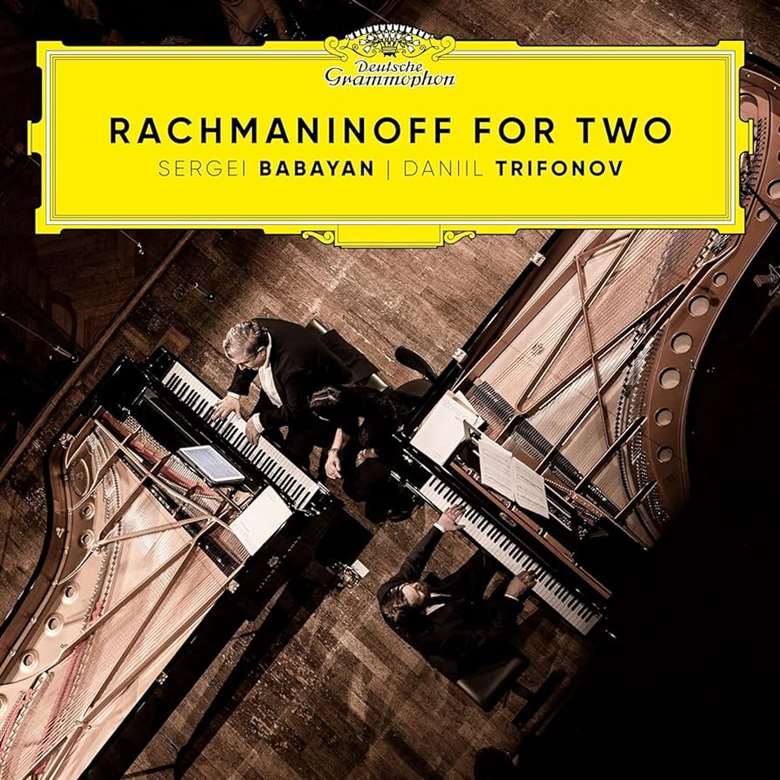Review - Rachmaninov for Two (Sergei Babayan, Daniil Trifonov)
Michelle Assay
Friday, May 24, 2024
‘This is dazzling piano-playing, to be sure, with an enviable display of clarity’

It comes almost as a surprise that this is Babayan and Trifonov’s first full album of piano duos, given their longstanding partnership and the number of concerts they have given together. That they should opt for an all-Rachmaninov programme is, on the other hand, no surprise at all. Babayan’s recent Rachmaninov recording finally showed him in a different light from ‘Daniil Trifonov’s sometime teacher and mentor’ (as Harriet Smith put it in Gramophone). And although his Rachmaninov, in its naturalness, might surpass his former pupil (HS again), Trifonov’s concerto series, for all its mixed reception, has certainly established him as a Rachmaninovian to be reckoned with.
So here is a chance to hear the two temperaments in tandem. And the result is not so much a harmonious blend as a juxtaposition of fast-and-furious with perceptive poetry, the balance tipping towards the former. The Second Suite in particular suffers as it flashes by like a thunderstorm. This is dazzling piano-playing, to be sure, with an enviable display of clarity. But it seems more concerned with impressing than expressing – legitimate defiance and drama being overshadowed by sound and fury. Does Rachmaninov ask for it by marking the first movement Alla marcia and the second and fourth Presto? Arguably. But here the march feels more like a mere étude, and the succeeding Waltz is a fast-forward caricature. As for the finale, the Tarantella lilt gets left for dust in the wake of hyperactive, supersonic athleticism. Compare this with Lortie and Mercier (Chandos), where each movement is characterised individually, with delicate shaping and shading, and where virtuosity is the servant rather than the master.
It is in the slower movements that Babayan and Trifonov truly impress. The Romance third movement of the Second Suite is appropriately poetic and dreamy, as is the Adagio from the Second Symphony in Trifonov’s own arrangement. Whether the latter establishes Trifonov as an heir to the great Russian composer-pianist tradition is too early to say. But I am by no means convinced of the choice of work, especially given that there are plenty of available fillers in the two-piano medium, not least Rachmaninov’s far-less often performed Russian Rhapsody. Not to mention that ditching the transcription would have allowed the three major works to be comfortably accommodated on a single disc.
As it is, the second disc opens with Rachmaninov’s First Suite, a series of heart-easing poetic tableaux, the first three of which are performed here with the utmost sensitivity and subtle flexibility. The two different pianos (Babayan plays a Steinway, Trifonov a Bösendorfer) blend remarkably well, and perhaps even help to bring out the inner lines of Rachmaninov’s gloriously intricate polyphonic canvas. Less convincing is the ‘Easter’ bells finale, which launches with self-conscious hesitations and continues, almost perversely, with expressive moulding precisely where it is not called for (when did Russian Easter bells ever indulge in rubato?). Lortie/Mercier’s unstoppable abandon is far more exhilarating (even if their Faziolis are thin-toned by comparison).
There are some outstanding moments in Babayan and Trifonov’s Symphonic Dances, in particular at the end of the first movement, where they unfold Rachmaninov’s heartbreaking self-quotation from his First Symphony in an oasis of quietude. Earlier in the same movement the episode with the ‘saxophone’ theme may not be as inwardly noble as Rachmaninov himself on his private recording (Marston Records), but it still makes its tear-jerking point. It’s again the faster sections where compulsive competitiveness and sheer velocity get in the way of the music. The opening, clearly marked Non allegro, is more like an allegro furioso, while some of the salient lines of the second-movement Valse and the finale (in particular the all-important ‘Dies irae’) are all but obliterated in the rush to the end. The recording quality is ample and hard-hitting, which may not be to everyone’s taste. In no respect would I rate this newcomer on a par with the classic Decca recording from Previn and Ashkenazy.
Rachmaninov Suites – No 1, Op 5; No 2, Op 17. Symphonic Dances, Op 45. Symphony No 2, Op 27 – Adagio (transcr Trifonov)
Sergei Babayan, Daniil Trifonov pfs
DG 486 4805 (2 CDs)
This review originally appeared in the Summer 2024 issue of International Piano. Never miss an issue – subscribe today













